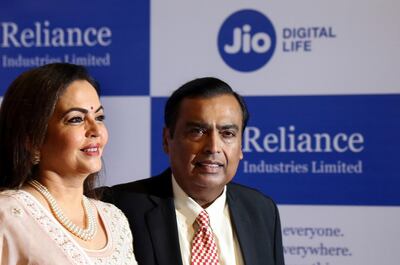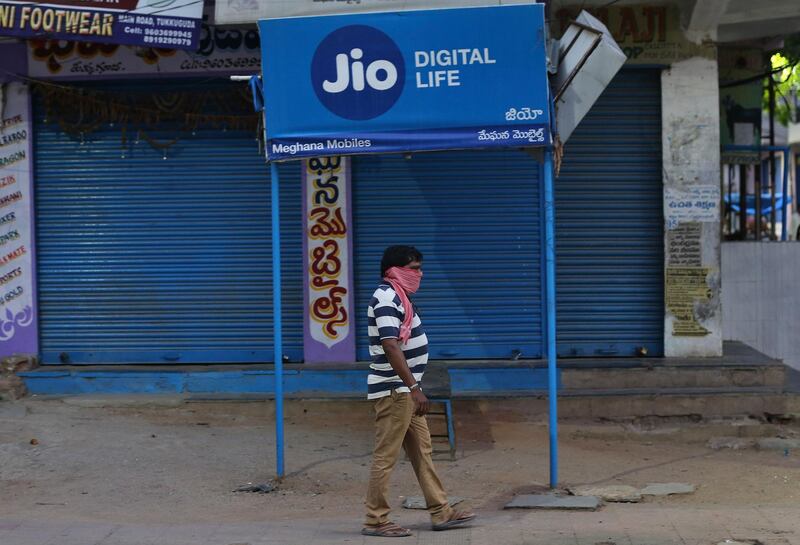Facebook's multibillion investment in the Indian digital company Reliance Jio comes as a bright spot in a country that is facing an economic challenge due to a coronavirus-induced lockdown.
The social networking giant’s move to secure a stake in Reliance Jio will benefit India and both companies at a time when the country's investment climate is struggling amid the pandemic, analysts say.
“The investment from Facebook in these trying times will send the right signal to the investing community that Covid-19 has had little or no impact on India’s digital economy,” says Blaise Fernandes, a board member at Gateway House, a foreign policy think tank based in Mumbai.
Last week, Facebook announced that it would invest $5.7 billion (Dh20.92bn) to take a 9.99 per cent stake in Jio Platforms, which is part of Reliance Industries, a conglomerate controlled by Asia's richest man, Mukesh Ambani.
This will make Facebook the largest minority shareholder in Jio Platforms, the parent firm of telecoms company Jio, best known for disrupting the market with highly competitive rates. Launched in 2016, it has managed to battle and even kill off much of the competition and now holds the title of being India's biggest telecom operator by subscriber base and by revenue. Jio has a subscriber-base of 388 million as of April 22 this year.
"The Facebook and Jio deal is the marriage of two super powers,” says Viram Shah, the chief executive and co-founder of Vested Finance, a Mumbai and California-based financial technology platform. “With the reach and deep pockets that both of them have, it will be a transformational partnership for India.”
Both the US social media giant and Reliance are focused on tapping the booming internet usage in the country, where people are increasingly shopping and interacting online. The fact that smartphones and data costs have become much more affordable in recent years has helped to propel this growth.
The number of smartphone users in India is expected to reach 859 million by 2022 from 468 million in 2017, according to a report by PwC and the Associated Chambers of Commerce and Industry.
“You cannot ignore an 800 million smartphone market, a nation of tech savvy citizens from all walks of life, a demographic dividend,” says Mr Fernandes. “This ecosystem in India will communicate, transact, purchase, and get entertained. Those are the benefits for Jio and Facebook.”
India is also Facebook's biggest market, with more than 400 million users on the Facebook-owned messaging platform WhatsApp.
Facebook chief executive Mark Zuckerberg in a video statement following the announcement of the deal said the company planned to work with Jio “on some critical projects that we think are going to open up a lot of opportunities for commerce in India”.
He added: “There are a lot of talented entrepreneurs [in India] and it's also in the middle of a major digital transformation that's being led by organisations like Jio, that over the last four years have worked to get hundreds of millions of Indians on to the internet.”
In particular, Facebook and Jio are planning to leverage their presence and reach in India to encourage more small businesses to operate online.
Jio Platforms, Reliance Retail and WhatsApp said they have entered into an agreement to further expand Reliance Retail's e-commerce business on its JioMart platform using WhatsApp. This means that the companies would work with local small grocery store owners, for example – of which there are millions in India – to allow customers to place orders from these shops over WhatsApp.
These corner shops have come to the fore amid a nationwide lockdown in India to try to contain the spread of the coronavirus in the country, drawing more people to shop from local stores for their groceries.

There has often been resistance to foreign direct investment into India among small businesses, which can be seen as a threat to their livelihoods, as they struggle to compete with corporate giants with deep pockets.
“Such initiatives and the capital infused should be used to develop the market and overall infrastructure in India rather than to merely rout competition and gain dominance,” says Praveen Khandelwal, the secretary general of the Confederation of All India Traders. But he adds that “e-commerce is a welcome step”.
He also urges a need to exercise caution and restrictions on how data gathered by Facebook and WhatsApp will be used.
Reliance and Facebook have not seen eye to eye over data policy in the past. The Indian government wants firms such as Facebook to store data locally in the country, a step supported by Reliance, but opposed by Facebook. It remains to be seen how these issues will be addressed going forward.
The deal also comes amid WhatsApp’s plans to launch a digital payment service in India, which would see it compete with the likes of Google and home-grown digital payments company Paytm.
"The investment by Facebook seems timely and strategic,” says Neerav Merchant, a partner at Majmudar and Partners, an international law firm based in Mumbai.
The move could allow Facebook to “capitalise on Reliance Jio’s rural penetration and expand Facebook and WhatsApp platforms to remote areas within India," he says.
Given the impact of the coronavirus outbreak and lockdown, there could be benefits from the deal for small businesses and entrepreneurs, he adds, as they can “use these applications, primarily, to expand their businesses in the Covid-19 era”.
He says that “in the long term, it is likely that Facebook and Jio will be able to successfully collaborate in numerous ways to capitalise on India's push for digitisation. But, one has to wait, watch and see whether the valuations so paid were attractive enough considering the Covid-19 and global slowdown”.
The investment is also a much-needed boost for Mr Ambani's Reliance Industries. The billionaire businessman, last year, promised shareholders that he would reduce the group's estimated $20bn of debt to zero.
“The investment from Facebook looks timely for Jio, as it would assist to ease off some debt as reflected in Jio’s parent company, Reliance Industries,” says Mr Merchant.
This is all the more important after regulators delayed approval of a plan for Reliance Industries to sell a stake in its refining and petrochemical business to Saudi Aramco for $15bn.
“The [Jio] stake sale is the first step in the steady unlocking of value across businesses,” says Probal Sen, an oil and gas analyst at Centrum.
“This will be a major cash boost for the Reliance group, since the current uncertainties in the crude oil market, may cast a shadow on the potential investment deal between Reliance and Saudi Aramco,” says Rajeev Shah, the managing director at RBSA Advisors.

Meanwhile, gaining such a strong foothold in India is critical for Facebook. A controversial attempt four years ago to increase its presence in India through the launch of its Free Basics service, which would give people free access to certain websites, including Facebook, was blocked by regulators.
India's government has been pushing its Digital India initiative that aims to have more services conducted over the internet, and the latest partnership could help with these efforts at a critical time.
“The synergy between Jio and Facebook will help realise prime minister Narendra Modi’s Digital India mission,” Mr Ambani said in a statement. “In the post-corona era, I am confident of India’s economic recovery and resurgence in the shortest period of time. The partnership will surely make an important contribution to this transformation.”






